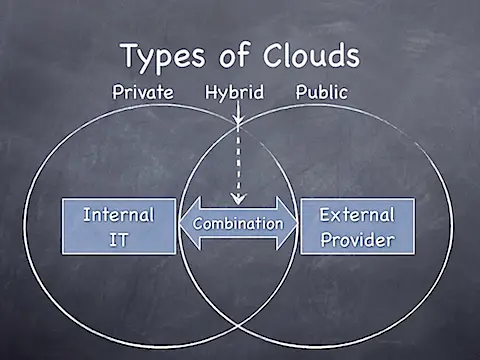In my last article, I tried to introduce you to the concept of Cloud briefly and Cloud computing. Now, let us understand what types of Clouds are available. We have three types of Clouds: Public Clouds, Private Clouds, and Hybrid Clouds.
Types of Clouds Computing

1] Public Clouds
These are the clouds open for use by the general public and exist beyond an organization’s firewall, fully hosted and managed by vendors like Google, Amazon, Microsoft, etc. They strictly follow the “Pay as you go” model, which helps startups to start small and go big without investing much in the IT infrastructure.
Here a user does not have control over the management of the resources. The third-party manages everything and is responsible for applying software updates, security patches, etc.
Though they are pretty effective and ease an organization’s effort since everything is already there, they face criticism, especially on security-related issues.
2] Private Clouds
These are the types of clouds that exist within the boundaries (firewall) of an organization. It is managed by an enterprise and has all the features of Public Clouds with a significant difference in that it has to take care of the underlying IT infrastructure. They are more secure as they are internal to an organization and shuffle resources according to their business needs.
They are best suited for applications related to tight security and follow some stringent policies or are meant for regulatory purposes. Due to its complexity and management, it is not very easy for an organization to go with a Private Cloud, so they are often used by enterprises that have made considerable investments in their IT infrastructure and have the workforce and abilities to manage it.
3] Hybrid Clouds
They consist of external and internal providers and a mix of public and private clouds. Secure & critical apps are managed by an organization, and the not-so-critical & secure apps by the third-party vendor. They have a unique identity bound by standard technology, thus enabling data and application portability. They are used in situations like Cloud Bursting.
In most countries, we are going to see a lot of investment in Hybrid Clouds in the next decade for the simple reason that lot of companies are skeptical about the Cloud’s Security, and they prefer that the critical data be managed by themselves and the non-critical data by the external provider.
From an end-user perspective, Public Clouds will be more interesting for them. We all use public cloud services like Microsoft Office Web Apps, Google Docs, etc., whereas an enterprise will be interested in private & hybrid clouds. I will suggest they check Microsoft Exchange online, SharePoint online, etc., for this.
What is Multicloud Computing?
In a multicloud approach, there is more than one cloud service from more than one cloud vendor – public or private. Multiclouds are hybrid clouds, but not all hybrid clouds are multiclouds. Through integration or orchestration, multiple clouds become hybrid clouds.
What is High-performance computing (HPC) cloud?
High-performance computing clouds offer cloud services for high-performance computers, sometimes called supercomputers. Some organizations use a supercomputer to perform complex computational tasks, such as forecasting weather or modeling chemical molecules. Cloud computing can help keep supercomputers running efficiently and provide organizations with the required services. HPC clouds provide enough data space and server power to keep supercomputers running efficiently.
Leave a Reply